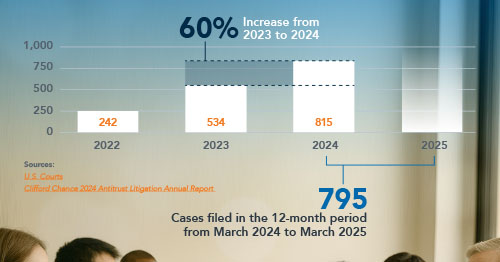
Top 5 AI Trends Every Law Firm Should Know for 2025
February 5, 2025
By:
Summary: Law firms that embrace AI in 2025 will gain a strategic edge in eDiscovery, from early case assessment to data-driven negotiations. Cutting-edge firms are using AI to analyze modern data, optimize document review, and protect sensitive information—faster and more accurately than ever before. Stay ahead of the competition by leveraging these top five AI trends shaping the legal industry.
In today's hypercompetitive legal market, law firms are rapidly discovering that traditional eDiscovery approaches no longer cut it. Most general counsel are now looking for law firms that can do more than simply handle discovery. They want firms that can use the discovery process to develop strategic insights and demonstrable advantages over opposing counsel—all while keeping costs predictable. In 2025, we expect that that will be an increasing differentiator between top firms and those being left behind.
So, it’s no surprise that corporate clients are increasingly pushing their law firm partners to lean into AI. In fact, in a 2024 survey—60% of in-house counsel stated that they expect their law firm partners to leverage generative AI. In this article, I’ll lay out the top five ways we see our law firm clients using AI to stand out from their competition when it comes to eDiscovery and information governance.

1. More strategic early case assessment
Some of our most innovative law firm clients are using AI to gain an early upper hand in litigation and investigations. By deploying strategic linguistic modeling during early case assessment, outside counsel can map out case strategy, predict costs with unprecedented accuracy, and identify potential smoking guns—when other firms would still be planning their approach. Rather than hunt and peck with non-strategic search terms or trying to learn prompt engineering as a side job, savvy attorneys are leaning on AI to help them gain an edge before opposing counsel even know what questions to ask.
2. Improved analysis of modern data
Generative AI models are proving to be effective at analyzing multi-modal data like images, audio, video, chat, and social media content. This capability is helping top law firms uncover crucial evidence that other firms miss and complete complex classification tasks at a much faster pace. For example, in a recent data breach matter being handled by a leading AmLaw 200 law firm, we used generative AI to classify complex elements and find personal information in jpeg images—without the need for OCR, which would have removed PII linkages. This enabled the law firm to meet their client’s reporting requirements much faster, at a fraction of the cost.
3. Better protection of sensitive data
Protecting sensitive data from being inadvertently turned over to the opposing side is a crucial differentiator for law firms. This is why privilege review is traditionally one of the most expensive and time-consuming elements of eDiscovery. Some of the most innovative law firms are now using AI to protect a variety of sensitive data types, including attorney-client privilege, IP such as source code, confidential business information, and protected personal information. We have seen that when AI models are built correctly, they can identify this type of information better than human review. Generative AI can then be used to take the next step, by—for instance—drafting the privilege log descriptions in a fraction of the time it would take a team of attorneys. Integrating AI into sensitive data workflows particularly resonates with law firms representing companies in regulated industries, where a single mistake can have devastating consequences.
4. Optimized document review
AI-powered review workflows are helping to transform document review from a cost center into a strategic advantage for top law firms. Firms are using advanced algorithms and expertly crafted workflows to break away from the traditional cost and time of review, standing out from their competition. Instead of having reviewers categorize documents for 10+ different issues, these law firms are using AI to tackle large swaths of tasks (e.g., identifying responsiveness, privilege, personal information, key documents, etc.). Integrating AI into review workflows allows human reviewers to focus more and work on more nuanced calls. The result? Better quality, faster reviews, earlier access to case-winning evidence—all at lower, more predictable costs.
5. Data-driven negotiations and defense strategies
Another way we see law firms using AI as a differentiator is to gain the upper hand in meet and confer hearings, settlement negotiations, and defense strategies. Rather than relying on the typical piecemeal view of the evidence available at the earliest stages of a matter, they're using data-driven arguments to define scope, justify positions, and negotiate from a position of strength. AI can help give law firms a holistic view of all the most important evidence buried in their client’s data much earlier in this process. This approach not only leads to better outcomes but also demonstrates value to sophisticated corporate clients who appreciate the strategic advantage.
The message is clear: In 2025, AI capabilities are becoming crucial to the success of law firms. Firms that continue to treat eDiscovery as a commodity service risk losing both cases and clients to more innovative competitors. The future belongs to those who recognize that in today's legal landscape, technological advantage and legal excellence are inseparable.
Visit Lighthouse’s AI services page to learn more.








